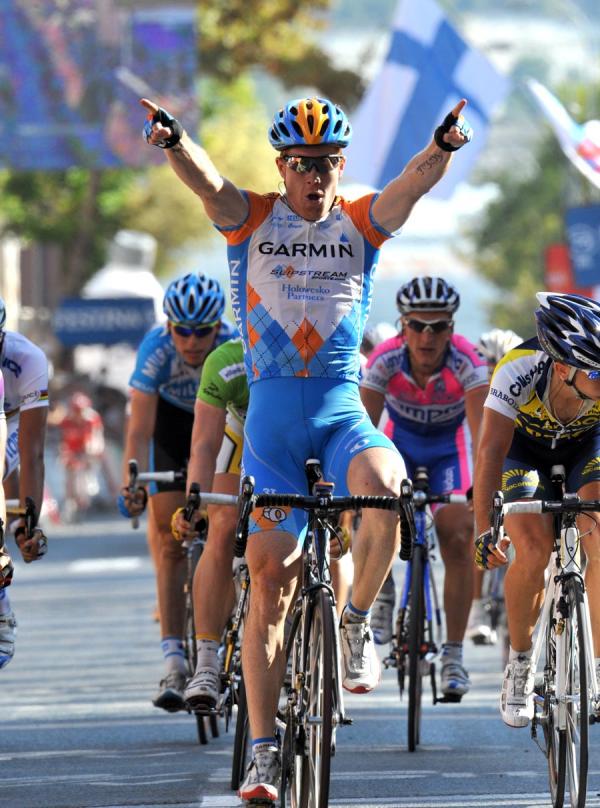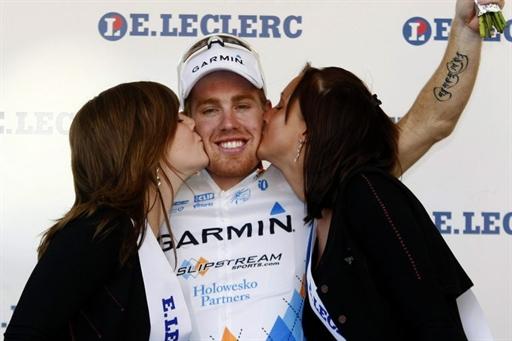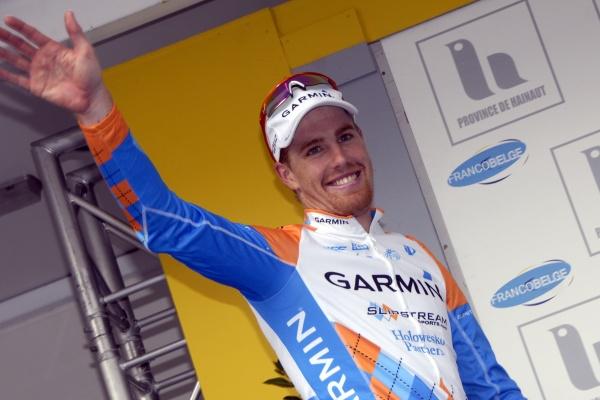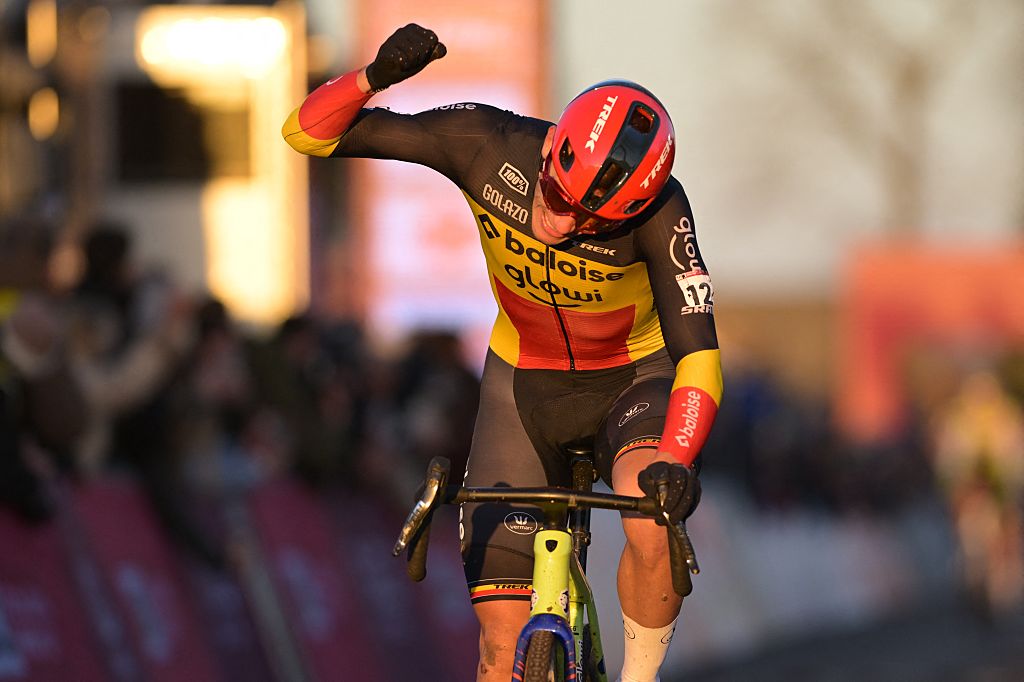Farrar's time to take things further
American sprinter turns a new page on his career



Tyler Farrar began reaping the rewards of his labour this season, with wins in the Vattenfall Cyclassics and a stage of the Vuelta a España. It's led to even greater anticipation of 2010, with the American knocking on the door of victory at Milano-Sanremo, the World Championships and stages of the Tour de France.
The 25-year-old from Wenatchee, Washington, started 2009 with a win in Italy and steadily progressed throughout the year. He won a stage at Tirreno-Adriatico in March providing him with confidence heading into the first of three grand tours, the Giro d'Italia.
He twice finished second to established sprinters Mark Cavendish and Alessandro Petacchi in the Giro and his consistency continued in July, where he secured a brace of second places to Cavendish at the Tour de France.
He kept a positive outlook and took revenge with several wins in the autumn, including German one-day event the Vattenfall Cyclassics and his first Grand Tour stage at the Vuelta a España. He ended the season with two stage wins and the overall of the Circuit Franco-Belge, marking him as a favourite in his final race of the season, Paris-Tours.
A time to start winning
Cyclingnews: You've taken a huge step forward in 2009. How did you improve on your climbing over the off-season?
Tyler Farrar: It was more of what I did towards the end of last season. I had a heavy race programme, a lot of races... it pushed me to become better over the hills.
Over the winter, working with the team trainer, I tweaked a few things in my training. It was nothing major, but some modifications. Then before the season, I had a solid training camp with the team in Silver City, New Mexico. We rode on a lot of mountain roads, up and down.
The latest race content, interviews, features, reviews and expert buying guides, direct to your inbox!
CN: Did you already feel like a different rider at the start of this season?
TF: I felt like I was continuing my progression, I felt strong. The progression continued throughout the season. I think I was a better rider in September and October than in March.
CN: How has riding in the Grand Tours helped?
TF: After every Grand Tour I felt like I was stronger, they certainly helped.
CN: You won a stage at Tirreno-Adriatico, Hamburg and a stage at the Vuelta a España (pictured below). Are you satisfied with these wins or as a sprinter is your hunger never satisfied?
TF: I'm satisfied with the season I had; it was a good year for me, but there are always more races you would like to do well in. I still have objectives and there are races out there I want to win.
CN: Milano-Sanremo, Gent-Wevelgem, Paris-Tours and Hamburg are your type of races. You won Hamburg and were aiming to win Paris-Tours after a successful autumn. What happened in the race?
TF: Everything was going to plan until there was a crash on the descent of the first of the three climbs in the finale. I didn't go down, but I was stuck behind the crash and it was the end of the race for me.
It would have been nice to do well there, but it can't always work out perfectly. This is by far the best season I've ever had.
Grabbing the leadership at Garmin Slipstream
CN: You re-signed for Garmin before the Tour de France. How will the team help you win those bigger races in 2010?
TF:I think we brought in a few guys who are going to be strong for leading out. I think the team is also starting to believe in me more and more as a rider. The guys have confidence to ride on the front for me.
We will have Robert Hunter, who will clearly be a help. I think Johan Van Summeren may not be the man for the last kilometre, but he is a good guy for the last few kilometres, for positioning he's a strong one. And I hear the young guy we signed, Jack Bobridge, is quick as well.
CN: Was it your idea to sign Robbie Hunter and did you give advice for the team's signings?
TF: I had more input as the year went on. The results I was getting gave me more of a say.
CN: Garmin must have been a big change from your first two years in Europe with French squad Cofidis. What was it like coming to Europe to race in 2006?
TF: It was a good experience, but a bit of a shock. I came over on trips with the US national team before and I had some idea, but my first full season was a culture shock. I think I found my feet and it's going well for me now.
CN: Who helped you the most in those first months?
TF: Nicolas Roche saved me. When I came to Cofidis I didn't speak French, he helped me know what was going on until I managed to learn the language. Tristan Valentin speaks English very well and also helped me out a lot.
CN: What differences have Jonathan Vaughters and Matt White made?
TF: I think team Garmin has unique relationships between the riders and staff. They [Vaughters and White] put a lot thought into personalities in addition to results when they select riders for the team. That helps out a lot; the morale on the team is always very high. We like each other and get along well, which helps in a big group.
Last year was a transitional year for me. I was new to the team and had not yet proved myself in the big races. I raced a lot of smaller races, I had decent success, but not the same type of attention you would get in grand tours. It was nice to see they were paying attention and then gave me the opportunity this year to get into the big races.
World championships down under?
CN: The 2010 and 2011 world championships are both suited to sprinters. What did you learn in Mendrisio this year that you can use in the next two editions?
TF: The Worlds is always a special race. You race all year with your trade team and you get to know each other really well. By the time August or September comes around you don't have to talk, everyone knows his job and what he needs to do.
At worlds it's a completely different dynamic with national teams. I have done all the world championships since I've been professional and I hope this gives me experience for the next two years.
